Jun 2, 2025 Opening Ceremony of the 9th 100-Day Practice for International Practitioners, Green Talk at the Environmental Foundation
Hello. Today is the day when international practitioners begin their 1000-Day Practice. Sunim also attended the Green Talk Concert hosted by the Environmental Foundation and gave a Dharma Q&A.
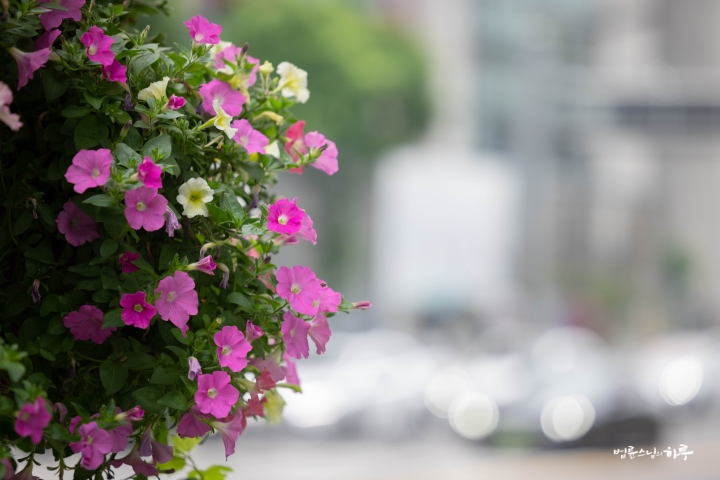
After completing morning practice and meditation, Sunim attended the opening ceremony of the 9th 100-Day Practice for international 1000-Day Practice participants at 8 AM in the broadcasting room of Seoul Jungto Center.
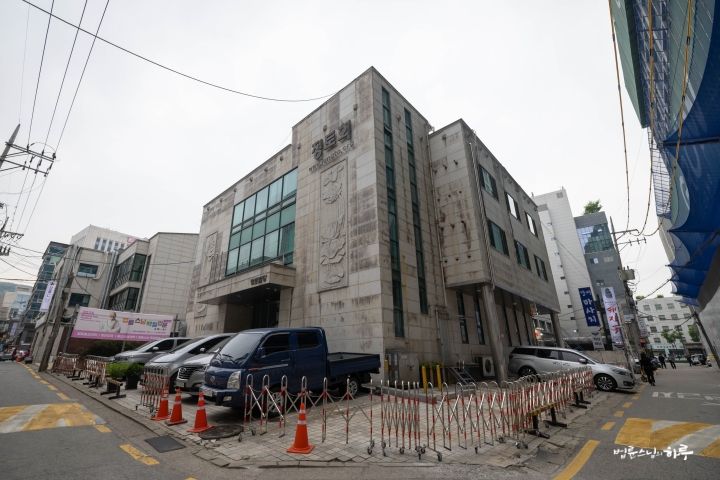
Yesterday, Jungto practitioners from around the world who use Korean began their 100-Day Practice, and today, Jungto practitioners from around the world who use foreign languages began their 100-Day Practice.
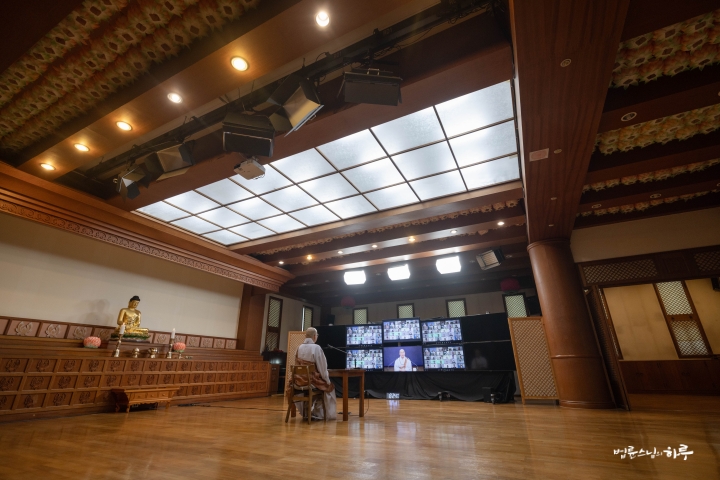
Once all the international Jungto practitioners entered the video conference room, the host warmly welcomed them.
“Hello and welcome to the Opening Ceremony of the 9th 100-Day Practice, which is part of the first 1000-Day Practice.”
Today’s opening ceremony was attended by 21 participants from around the world, including the United States, Canada, Hong Kong, Korea, Japan, Indonesia, Italy, Ireland, Australia, and the United Kingdom. First, participants shared their reflections from practicing diligently over the past 100 days.
Craig Lewis from Hong Kong shared his reflections first.
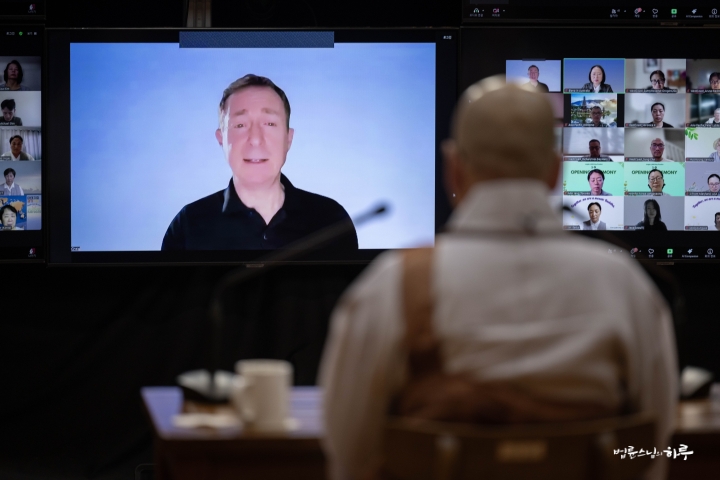
“Jungto Society recently concluded the 100-day 2025 Dharma Talk Festival. And I had the privilege of joining the weekend practice days — for 1,080 prostrations on Saturdays and extended meditation on Sundays.
Although my body has grown more comfortable with sitting in meditation since I became a Jungto practitioner … I’ve always been bothered by physical pain during longer sitting sessions. But something shifted during this year’s practice at Jungto Center: for the first time I was able to sit without moving until the end. During the meditation sessions, I noticed shifting contrasts — between physical discomfort and mental discomfort; between a restless mind and moments of quiet. Yet I felt encouraged and supported by the focus of the practitioners around me.
For 1,080 bows … I was nervous! It seemed like a marathon to me! When I learned to let go of my mind during the practice, I was able to complete all of the bows before the end … I might even say that I found that there was only one prostration needed to complete 1,080.
This experience has helped to change my perspective toward practice. Since taking part in both of these practices, I’ve found that daily practice is now much easier. 108 prostrations used to feel like a burden — and I’d often feel lazy in the morning. Now, I know that 108 bows doesn’t have to be a big deal. I also found longer meditation to be very helpful. Now, I sometimes feel that 10 minutes in the morning isn’t enough. Sitting alongside other practitioners is also a very different experience than sitting alone. This is something that I hope I can explore further.”
Following this, everyone offered three prostrations to request a Dharma talk from Sunim. Sunim spoke to the international Jungto practitioners about the perspective that practitioners should maintain to live a life free from suffering. He also expressed gratitude to those who volunteered to teach English to students at Sujata Academy in India’s untouchable villages over the past 100 days.
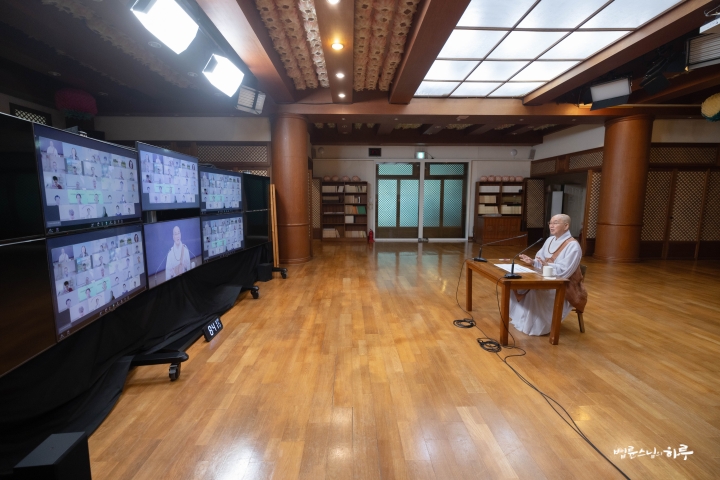
“Today marks both the completion of the 8th 100-Day Practice and the beginning of the 9th 100-Day Practice of the first 1000-Day Practice. How should we spend the next 100 days?
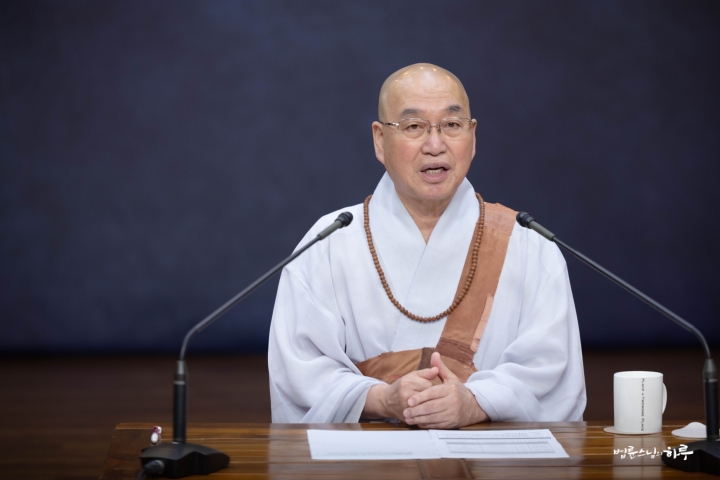
First, practitioners must base their lives on practice. Practice is the path to living a free life without suffering. Second, we must maintain equanimity. The attitude of a practitioner is to maintain one’s center without being swayed by the surrounding environment. Third, peace in society must originate from inner peace. Only when there is no anger in our hearts and we do not hate others can we move toward achieving peace in the world.
What Should We Do When Our Hearts Are Troubled?
So how can we maintain peace in our hearts? Everyone faces difficulties in life. This can lead to stress and suffering. At such times, we must ask ourselves, ‘What is really the problem?’ When we face life directly, we realize that there is actually no problem. On the surface, there seems to be a problem, but when we look closely, there is no problem at all. At first glance, it seems painful, but when we look deeply, there is nothing to be troubled about.
For example, if you lose money, it is certainly regrettable. However, when you think about whether it is truly something to suffer over, it is not. We lived well even when we didn’t have that money. Therefore, we simply don’t have the money – there is no reason to suffer. Let’s say you broke up with someone you love. While this is also regrettable, whether it is truly something to suffer over is worth reconsidering.
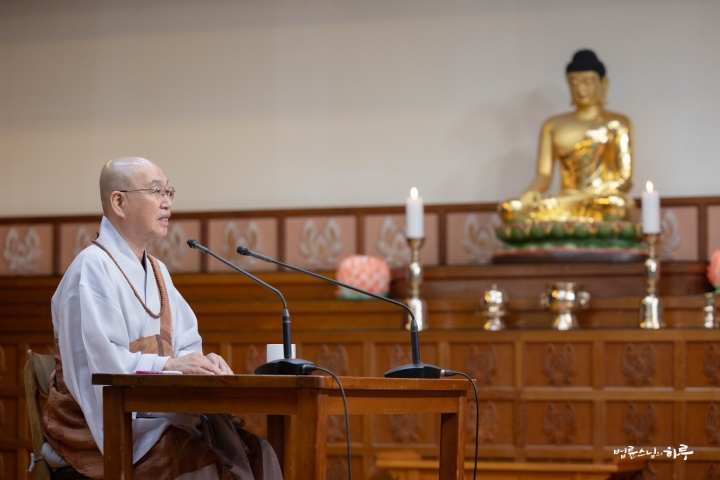
When working on something, there are times when things don’t go smoothly and feel overwhelming. While having many tasks to complete can exhaust both body and mind, this is not a reason to suffer. This is because suffering does not arise from the tasks themselves but from the mind. When trying to solve problems while in a state of mental suffering, not only do things not work out well, but they also feel even more difficult. Conversely, when you observe the situation as it is and recognize that ‘this is not something to suffer about,’ and then approach the task, your mind becomes much lighter and the work becomes much easier.
So if you are experiencing a lot of stress, I encourage you to first ask yourself, ‘What is the problem?’ Don’t avoid, run away from, or bury the tasks at hand, but face them directly. Once you confront the problem in this way, you will realize that there is actually no problem at all. In Buddhism, this is expressed as ‘the true nature of all dharmas is emptiness.’ You must first establish this perspective of practice. Without this perspective clearly established, you remain in a state similar to talking in your sleep or running from robbers in a dream. In such a state, no matter how much you practice, it’s difficult to make progress.
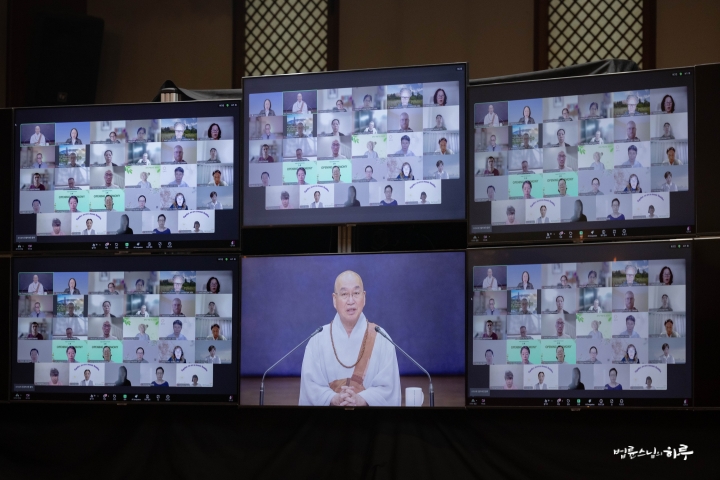
So does this mean nothing is really happening? Fundamentally speaking, nothing is happening. However, in our reality, problems continue to arise. To explain this through Buddhist doctrine, saying “nothing is happening” refers to a state where fundamental ignorance has disappeared. Yet in reality, problems constantly occur. This is due to momentary ignorance. As we unconsciously react according to the habitual patterns of our past karma, we experience difficulties, suffering, and stress moment by moment. To avoid falling into this momentary foolishness, we must always remain aware. Even if we fail to be aware in a moment, if we recognize “I missed it” and become aware right here, right now, the suffering disappears. We must consistently practice this recognition. This is why the Buddha said, “Practice diligently, like water drops that eventually penetrate rock.”
When I say this, some people ask, “Then how long must we practice?” However, thinking “how long must I do this” itself is evidence of enduring. When you endure, you experience stress and eventually quit. So you must let go of the thought of “how long.” If you have the perspective of “If it’s the right path, I simply do it,” you can continue steadily, whether for 100 days or 1,000 days. As you continue steadily in this way, suffering will decrease in your life and peace and comfort will increase.
The Energy That Tormented Me, Now Becomes the Power to Help Others
There is something special I would like to express gratitude for among the activities of the past 100 days. JTS provides educational opportunities for poor children from the Dalit (untouchable) caste in India. Since this region is so remote, it is very difficult to find good teachers. However, three members from India in Jungto Society’s International Division graciously volunteered to teach online classes for them. Of course, it would be better to volunteer in person on-site, but when site visits are difficult due to various circumstances, there are many ways to volunteer online like this.
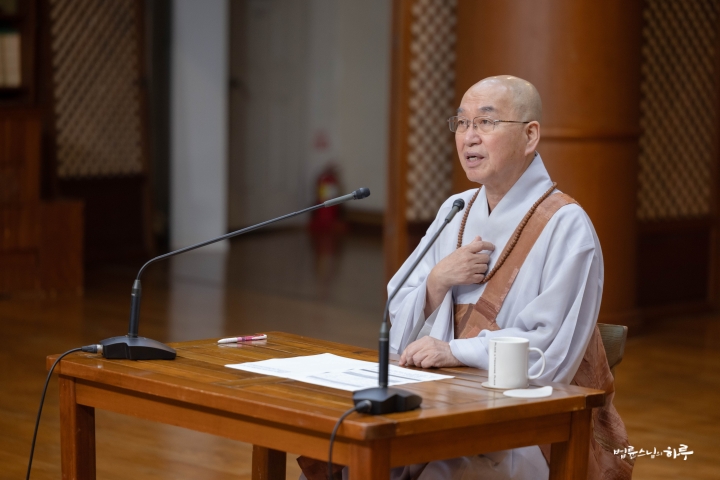
In addition to this, JTS is actively conducting various relief activities around the world. In Bhutan, sustainable development projects are being carried out to improve living conditions for residents of 65 villages in two poor provinces. In Syria, which suffered great damage from a long civil war, reconstruction projects are underway to rebuild national hospitals and establish schools. In Pakistan, housing is being constructed in areas damaged by Indus River flooding, and in the Mindanao region of the Philippines, efforts are being made to build schools for indigenous villages, Muslim villages, and children with disabilities. Beyond this, various support projects continue in many countries including Myanmar and Sri Lanka.
While protecting the natural environment or donating material goods for poor neighbors are wonderful acts, for practitioners, donating one’s talents also brings great joy. We use much of our energy to torment ourselves. However, when we realize the fact that “I have no problems,” we can use that energy for people who truly need help. Only then can we become practitioners living a life that is good for both ourselves and others. To make all of this possible, above all, practice must be the foundation that leads us to a state where we are not suffering. So I hope you will continue to practice diligently for the next 100 days.”
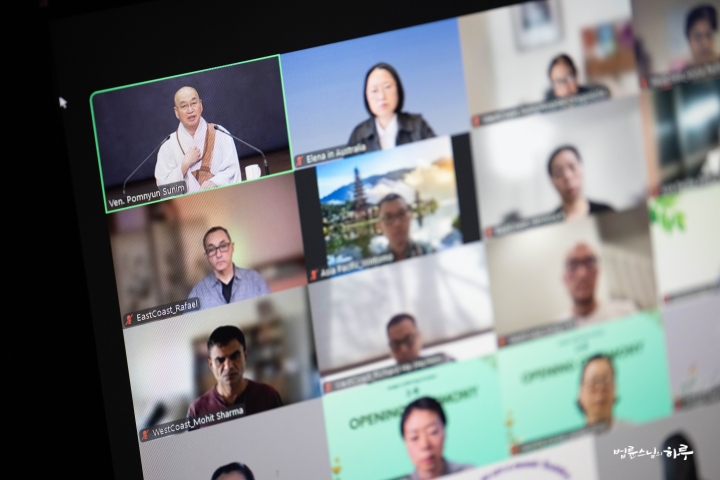
Next, Sunim received questions about practice from those who were curious. After one person pressed the hand-raising button and had a conversation with Sunim, the 100-Day Prayer opening ceremony concluded after 9 o’clock.
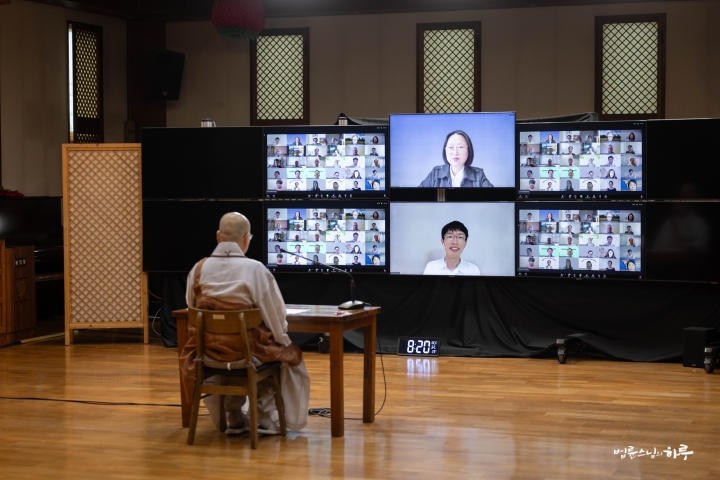
Sunim left the broadcasting room a bit early due to poor health. Since he wouldn’t be able to receive treatment once his overseas schedule began the day after tomorrow, he took some time to visit the hospital for medical care.
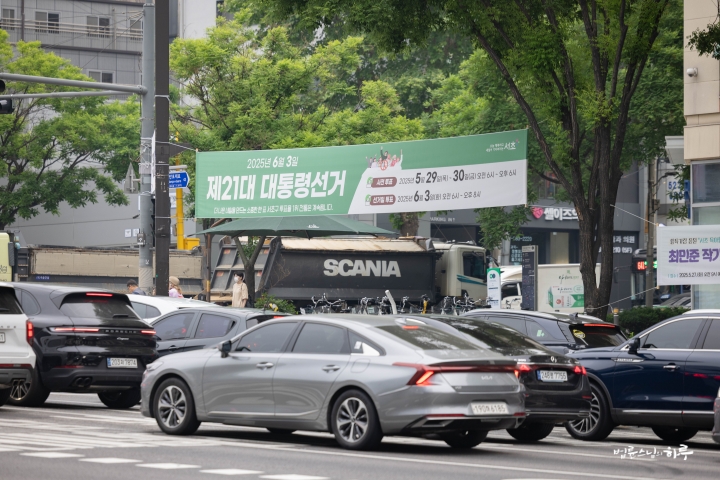
After returning from the hospital and having lunch, Sunim departed from Seoul Jungto Center at 12:20 PM and headed to Daejeon.
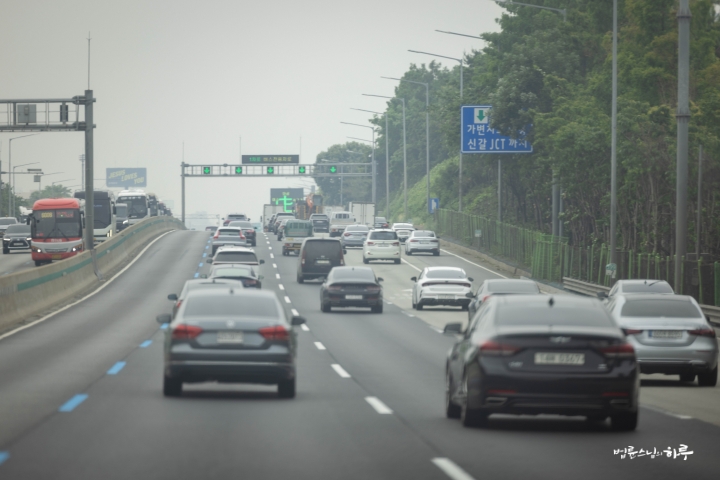
Ahead of World Environment Day on June 5th, the Environment Foundation requested Sunim to give a lecture on the topic “Small Practices That Change Our Lives.” After a 2-hour and 20-minute drive, Sunim arrived at the KAIST auditorium in Daejeon at 2:40 PM, where the lecture was to be held. Soon after, Chairman Choi Yeol of the Environment Foundation arrived, and they exchanged warm greetings.
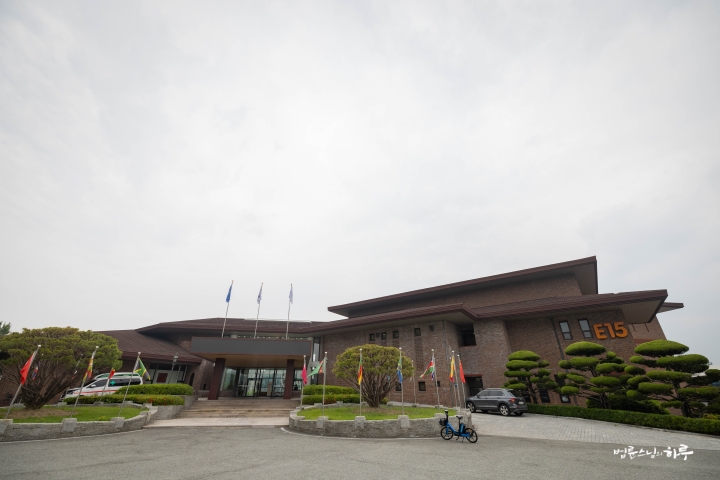
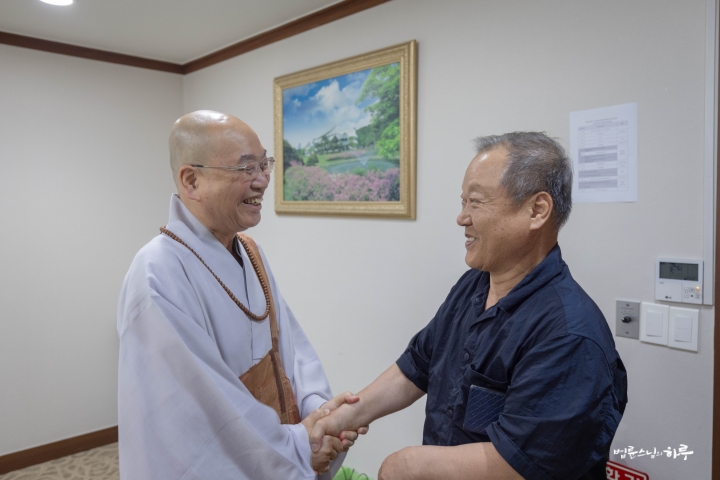
Before the lecture began, Sunim had a tea conversation with officials from the Environmental Foundation and KAIST.

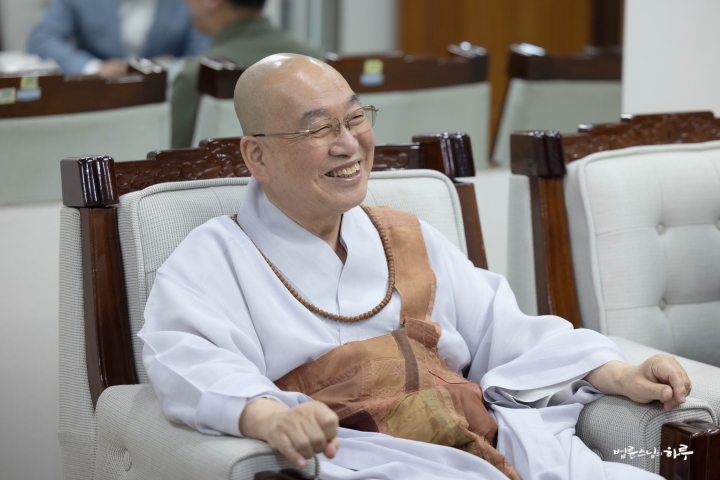
KAIST doesn’t usually rent out lecture halls to outsiders, but they made a special exception today because Venerable Pomnyun Sunim was giving the lecture. As they chatted with smiles, it was time to begin the lecture.
At 3 PM, everyone moved to the lecture hall together. About 700 citizens filled the KAIST auditorium. When the host introduced Sunim, he received loud applause as he stepped onto the stage.
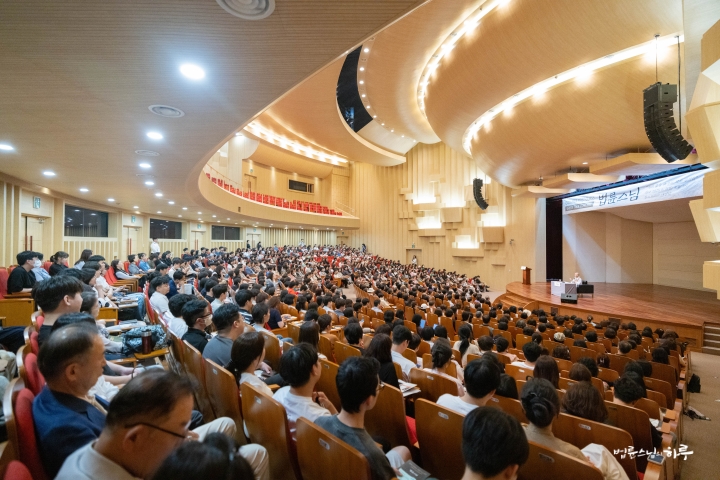
Before beginning the Dharma Q&A session, Sunim first gave a keynote lecture on today’s topic, “Small Practices That Change Our Lives.”
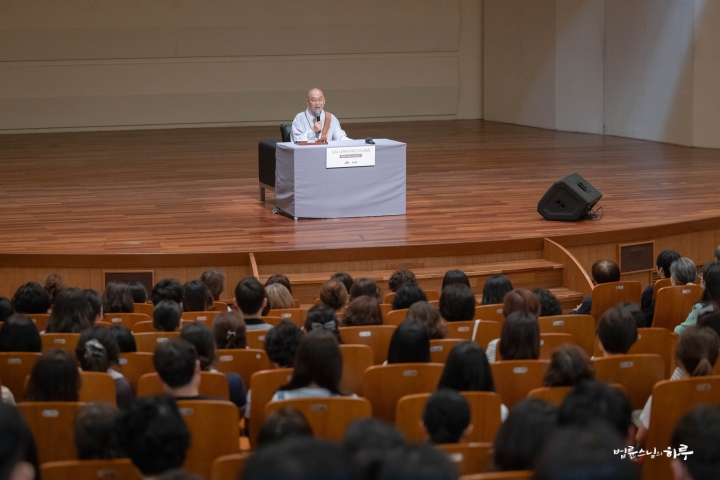
“During the COVID-19 pandemic, I spent my time farming in the countryside. One winter, the temperature suddenly dropped dramatically, and I heard on the news that about half of Korea’s honeybees had died as a result. At the time, I simply thought, ‘Honey production will be difficult this year,’ and let it pass. But when I farmed that year, I couldn’t properly harvest fruits, pumpkins, or cucumbers. What was the reason? There weren’t enough bees, so pollination didn’t occur properly. Only then did I realize how important the existence of bees is.”
If Bees Disappear, Our Dining Tables Disappear Too
When I looked up the data, I found that if bees completely disappeared and natural pollination couldn’t occur, humanity’s food production would decrease by as much as 70 percent. You realize how precious those small bees are. The disappearance of bees is far more frightening than disasters like volcanic eruptions or earthquakes that destroy a single region. If bees disappear, the entire ecosystem collapses, and food shortages become particularly severe.
At that time, looking at the bees, I suddenly thought of car parts. A car is made up of about 20,000 parts, and if even one is missing, it won’t function properly, right? It’s the same with bees. Within the circular structure of the ecosystem, even if just bees disappear, the entire cycle takes a major hit. Yet we live without even knowing how precious small creatures like bees and butterflies are to our lives.

It is difficult to imagine at this moment just how serious the consequences of the climate crisis will be in the future. The signs of climate crisis that we are experiencing now are probably limited to natural disasters such as sudden floods, droughts, and wildfires. However, as temperatures have already risen, fruit cultivation areas are gradually moving northward, and fish that used to be caught in the West Sea or South Sea are no longer easily found there. Additionally, squid and pollack that were caught in the East Sea are moving further north, even up to the Sea of Okhotsk.
These changes may feel like just minor inconveniences or somewhat dangerous occurrences right now. However, as more time passes, things we never imagined could actually happen, such as bees completely disappearing from Earth. If that happens, food production would become difficult and the entire ecosystem could collapse. Humanity could literally face extinction. Until now, we have imagined that humanity might perish due to nuclear bombs, asteroid impacts, or yet-to-be-discovered new viruses. But in the future, we may face completely unpredictable dangers different from these threats.
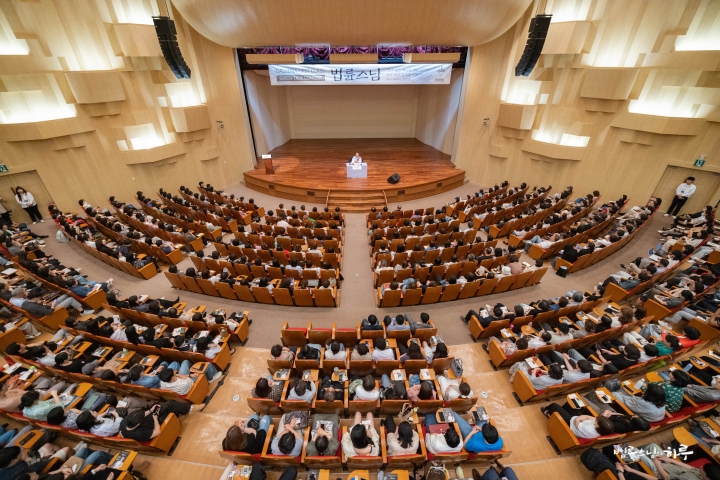
Why We Need to Stop Consuming: “I Will Not Buy Anymore”
However, the problem is that humans bear great responsibility for bringing about this crisis. The belief that consuming more means living better has spread throughout society, and this value system has encouraged mass consumption. Mass consumption leads to mass production, and mass production rapidly depletes Earth’s resources. As a result, resource wars break out, and while artificial resources are developed as alternatives, they bring other side effects. Moreover, mass consumption creates massive amounts of waste. This waste significantly impacts the global environment, making climate change increasingly severe. Ultimately, humanity may face extinction or many species may disappear due to climate change before resources are depleted.
Throughout Earth’s history, climate change has occurred dramatically several times, causing numerous species to go extinct in short periods. If such changes are part of natural cycles, we have no choice but to accept them. However, if they are the result of our artificial actions, then the responsibility lies with us. If our efforts to live better have instead led us to destruction, then we have been foolish. Yet people still do not fully grasp the severity of this problem. The same is true globally. U.S. President Trump did not acknowledge the climate crisis, and on January 20, 2025, immediately after beginning his second term, he signed an executive order to withdraw from the Paris Agreement again. Responding to the climate crisis requires cooperation from the entire world. However, major countries are actually not cooperating. In fact, we ourselves are not much different. We first think, “Is the climate crisis really that serious?” and consider living more conveniently today to be more important than addressing it. This is our reality.
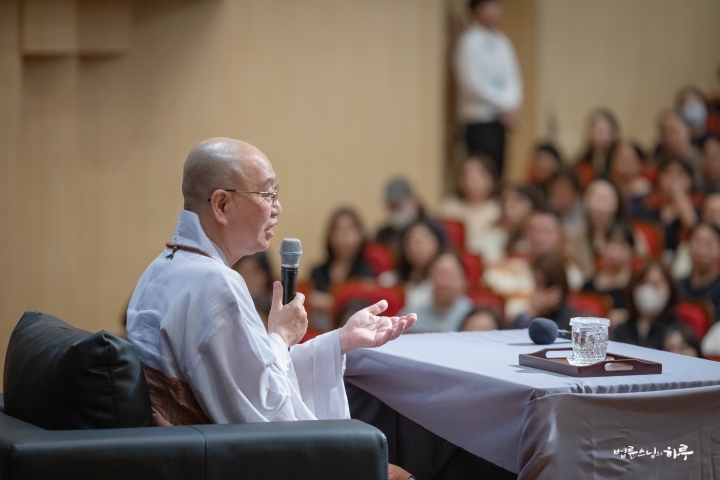
Until now, we have considered a life of high consumption to be a good life, but this value system has reached its limits. It is no longer a sustainable way of living. Yet we are still captivated by this mindset. We have become accustomed to a life of high consumption and have lived as if it were natural and inevitable. As a result, we have become like consumption addicts – even when we want to stop, we find it difficult to do so. What will happen then? Eventually, we will face catastrophe. We will reach the edge of a cliff with countless sacrifices to follow, and perhaps only some living beings will survive.
But is it really enough if only I live well? This world is one where our children and descendants must also live. And we must coexist not only with humans but with many other living beings on this earth. If we think this way, we must go beyond reducing consumption – we must stop consumption altogether. That’s why Jungto Society is currently conducting a ‘Stop Consumption Movement.’ ‘Let’s stop consumption!’ This is what I want to tell you today.
At most, I probably have about 10 years left in my life. So I have decided not to buy any more clothes. The clothes I already have are more than enough to last me a lifetime. Although I don’t have many clothes, I don’t think I’ll be able to wear all the ones I have. And the Buddhist robes, kasaya, and jangsam that I wear – there’s no one to pass them on to even if I wanted to. You might at least have someone who could wear your hand-me-downs, but I don’t even have that possibility. In the end, all that’s left is to burn them. So we must stop consumption right now. Whether it’s clothes, shoes, or anything else – now is the time we need to ‘stop consumption.’

In the Era of Climate Crisis, Overconsumption Is Now a Crime.
The fundamental cause of the environmental problems and climate crisis we face today ultimately lies in excessive consumption. Because we consume too much, carbon dioxide emissions increase proportionally, resulting in the climate crisis. In other words, overconsumption has brought about the climate crisis. So who are the main culprits of this overconsumption? Is it the low-income class or the high-income class? What’s clear is that those who live affluently consume far more. Then, in this era of climate crisis, should the high-income class be objects of envy? Or should they be people who must take responsibility? I believe the high-income class should not be objects of envy but people who take responsibility. If someone threatens countless lives and brings great misfortune to the world, that’s not just a simple mistake—it constitutes a serious crime. In the era of climate crisis, overconsumption is a criminal act. It’s just that the law hasn’t properly defined this crime yet. For example, with gambling, authorities let it slide when it’s small-scale, but when the stakes get high, they prosecute. Similarly, if today’s overconsumption were to be legally defined as a serious crime threatening all of humanity, it would certainly warrant severe punishment.
However, because it’s not yet legally defined, instead of punishing such people, we actually envy them. Many people envy them, thinking, “I wish I could live like that just once…” But if someone gave me the things they consume, I would throw them in the trash. What about you? Even if someone gave them to you, would you throw them in the trash? Or would you see them in the trash and pick them back up? (laughter)

While you criticize such excessive consumption, you would be happy and envious if you became the daughter-in-law or son-in-law of a wealthy family. You would also be pleased if you became in-laws with them. Unless this mindset changes, it will be truly difficult to overcome the climate crisis. In this era of climate crisis, excessive consumption is not just an individual problem. It is a serious crime that can threaten the lives of all humanity and every living being. We must be aware of this fact.
A Life That Is Good for Me, Good for Others, and Good for the Earth
Compared to the past, we now have plenty of food, clothing, and shelter. The life we enjoy today is better than that of kings in ancient times. So there’s no need to keep being greedy, wanting more. If we change our mindset this way, first, life becomes much more comfortable. Second, there’s less need to compare or compete with others, reducing conflicts. Third, by consuming less and sharing what’s left with others, we gain more freedom in life. Most importantly, this way of living becomes a practical action to overcome climate change.
What if we all lived this way together? Shouldn’t we live a life that is good for me, good for others, and good for the world? With this perspective, there is hope for modern civilization. Yet when I say this, some people respond, ‘Sunim, what difference will it make now? Isn’t it already too late?’ However, if there is a path, shouldn’t we take it? Whether that path will succeed or fail is a secondary issue. If there were no path at all, that would be different, but if there is a path that can make things even slightly better, I believe we should take it, even if just for a day or a month. We must walk together on a path that saves both people and the environment.”
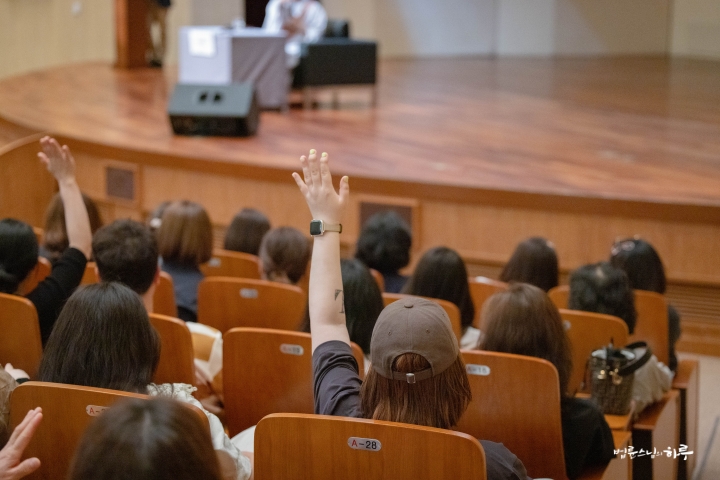
Following this, participants were given the opportunity to freely ask questions. Anyone could raise their hand and ask Sunim a question. During the one-hour session, six people had conversations with Sunim. One of them sought Sunim’s advice on how to live life well.

How Can I Live Life Well?
“The wisest attitude is to ask yourself what the problem is and adopt the perspective that ‘it’s not a big deal.’ If you’re suffering because you’re facing divorce, ask yourself, ‘What’s the problem?’ Think seriously about why you’re suffering over separation. After all, even if you separate, you’re just returning to the state you were in before you met. You’re breaking even. (Laughter)
You lived well on your own before marriage, didn’t you? But after experiencing married life, you feel it’s worse than being alone, so you want to separate. In the end, you’re returning to what you wanted, so what exactly is the problem? When suffering comes in life, instead of trying to avoid it or cover it up, you should ask yourself each time, ‘Is this really a problem?’
For instance, if your mother passed away, ask yourself, ‘What’s the problem? Why is the fact that my mother died a problem?’ In human history, no one has escaped death, and death is simply a natural fact. So why is it a problem? Ultimately, the problem isn’t the fact of death, but the attachment within you thinking, ‘I wish she hadn’t died.’ Holding onto the regret that she shouldn’t have died when she already has—that’s foolishness.
To live wisely, whenever suffering overwhelms you, you must ask yourself, ‘What’s the problem?’ and ‘So why is that a problem?’ After reflecting on it a few times, you’ll naturally realize, ‘It’s not a big deal!’ That’s when we can finally live wisely.”

The next questioner was a 27-year-old young man who asked Sunim for advice, saying he still didn’t know what he wanted to do with his life.
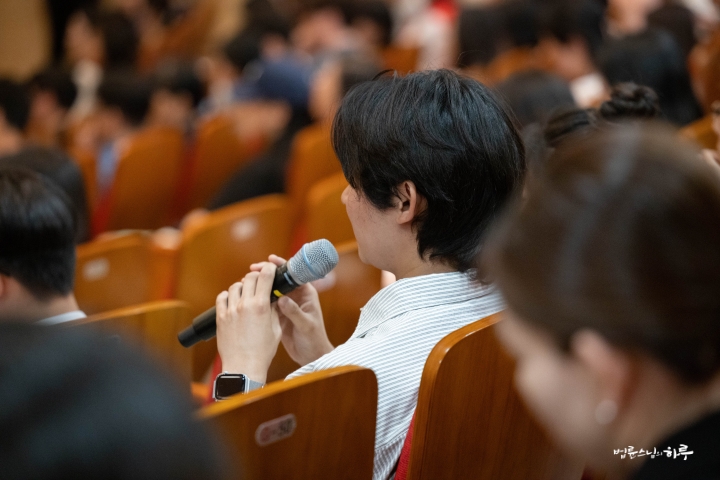
I Don’t Know What I Want to Do
“Where do you live? Do you live with your mother?”
“I live alone.”
“You said you’re not doing anything, so what money are you living on?”
“I am actually working.”
“So you’re earning enough to feed yourself?”
“Yes.”
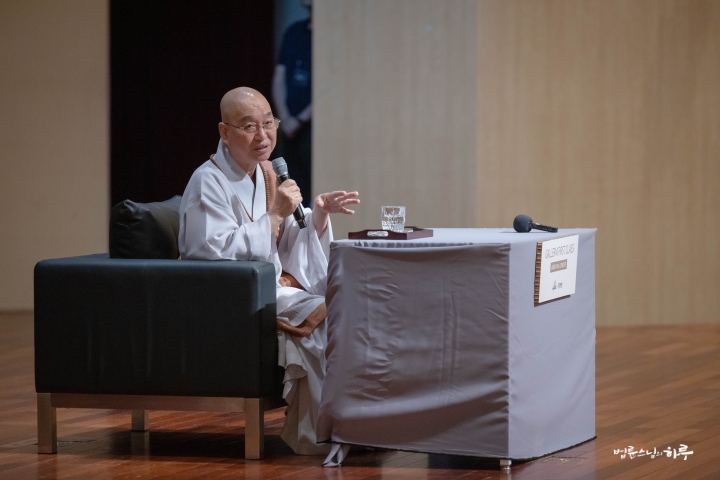
“Then that’s fine. Sometimes people can do what they want to do, and sometimes they have to do things they don’t want to do because their talents are recognized and they have no choice. But in such cases, it’s easy to get stressed. You can accept such work as a job for making a living, and do what you want to do as a hobby. For example, if you want to sing but can’t make a living from it, you can make a living doing something else and enjoy singing as an amateur singer. On the other hand, if you have nothing you want to do and nothing you’re good at, just make a living. Do all living beings in nature live doing what they want to do? Do they live doing what they’re good at? Neither. They just live making a living.
As long as it’s not a crime, it doesn’t matter what you do. Whether you carry things or clean, you just need to make a living. You don’t need to be swayed by what others say. Don’t be too shaken by comments like ‘What do you really want to do?’ In the past, even if people wanted to do music or sports, they were told, ‘It’s hard to make a living from that, so go to engineering school. Or go to business school.’ But now society has changed. We’ve entered an era where you can make a living through art, so now the opposite message has emerged: ‘Do what you want to do.’
However, ‘Do what you want to do’ and ‘Find what you want to do’ are completely different things. These days, even elementary school students are constantly asked by parents and teachers, ‘What do you want to do?’ Then the children become confused and come to me asking, ‘Sunim, I don’t have anything I want to do. What should I do?’ This attitude from parents and teachers has become a serious problem for children today. You may have something you want to do, or you may not. You may have something you’re good at, or you may not. That’s life.

Rather, if you’re worried because you don’t have anything you want to do, I think that’s actually a better situation. Because you can do anything. If you set your mind on doing music specifically, you’ll experience great suffering when you can’t pursue music. But if there’s nothing you particularly want to do, you can go to any university, any department, and do any kind of work. It actually broadens your career choices. So parents shouldn’t keep asking their children, ‘What do you really want to do?’ In fact, that question often comes from parents’ desire to fulfill their own unfulfilled dreams through their children. They try to induce their children to want something, and if it goes well, they feel vicarious satisfaction. Their greed grows, and they may even try to hit the jackpot through their children. In the end, the children become sick.
Parents shouldn’t project their desires onto their children. Children just need to grow up healthy and be able to live their own lives. When they’re young, we shouldn’t abuse them; during adolescence, we shouldn’t overprotect them; we should raise them to be able to live independently in whatever they do. What’s important isn’t that our child came in first place, but that our child can manage their own life independently.”
“Thank you. I understand well.”
As they conversed, it was already time to wrap up.
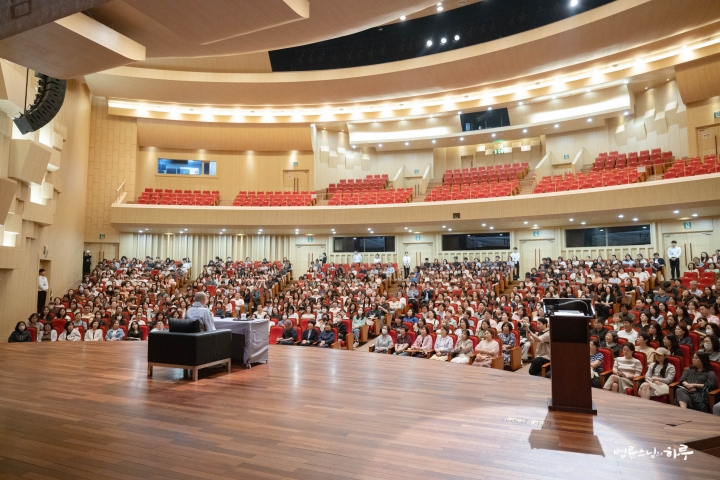

When Sunim finished the lecture and came down, an event for on-site participants was held. Sunim immediately left the lecture hall, exchanged greetings with officials from the Environmental Foundation, and then departed from Daejeon.
Leaving Daejeon at 5 PM, Sunim headed to Dubuk Jungto Retreat Center. After a three-hour drive, he arrived at Dubuk Jungto Retreat Center after 7 PM and concluded the day’s activities.
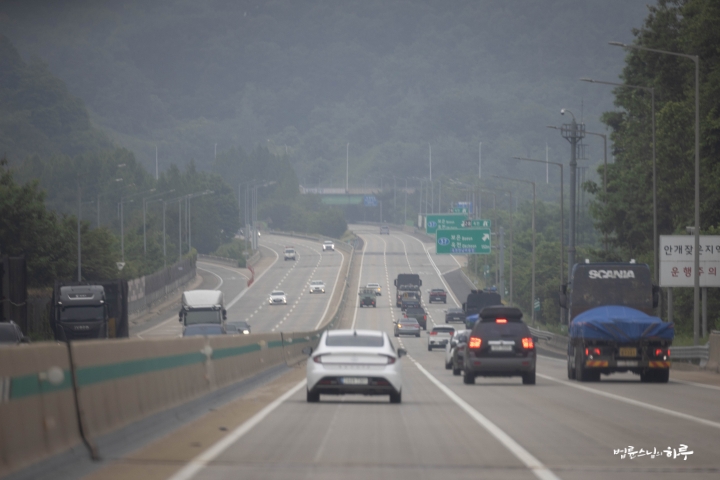
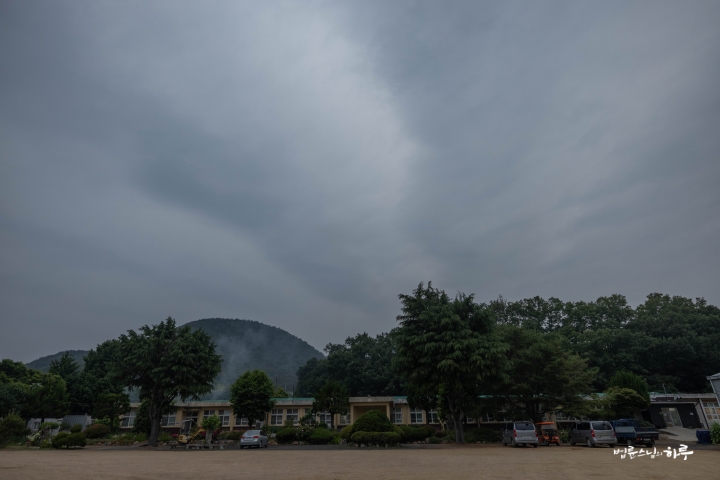
Tomorrow, after holding a memorial service for the 161st anniversary of Master Yongseong’s birth at Jukrim Jeongsa Temple in Jangsu, Sunim will have a Dharma Q&A session with on-site participants and tour the Yongseong Memorial Hall construction site. In the afternoon, he will travel to Seoul, and in the evening, he will hold a meeting with volunteers on the topic of ‘Youth Dharma Propagation.’





